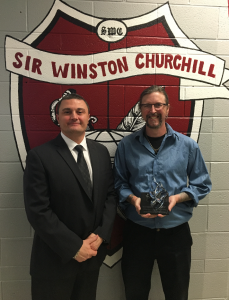
Churchill teacher wins Holocaust education award
Aaron Puley, department head of Canada and World Studies at Sir Winston Churchill Secondary School, has been given the Sharon Enkin Award for Excellence in Holocaust Education for engaging students in learning about the Holocaust through a digital lens.
The award from the Hamilton Jewish Federation is presented annually to an elementary or secondary teacher in any discipline who has demonstrated a commitment to teaching students about the Holocaust and its important lessons for humankind.
Teaching the course Genocide and Crimes Against Humanity, Puley felt its dark themes led students to focus on the evil of the Holocaust rather than the victims and the triumph of surviving the atrocities. Puley was moved by a connection he made with Holocaust survivor Nate Leipciger during a Facing History summer course. He wanted his students to have the same unsetting, visceral link to survivors.
Puley ordered a set of memoirs by Holocaust survivors from the Azriel Foundation, and laid 30 of them on a table for his students so they could “go shopping” and select one.
“There excitement and discussion as students took time to find a survivor memoir that they thought would be best for them to read,” Puley said. During the activity, students reflected on why they chosen their survivor. “I framed it around ‘This is your survivor – for you to get to know and you are responsible to share their story.’”
Students had time to read and share their stories, becoming more and more emotionally engaged.
“Independently, they had discussions of ‘My survivor Arthur had this happen…. what has happened to your survivor Henia?’” said Puley, noting the pride students felt in being responsible for sharing their survivor’s story.
Known at HWDSB for embracing digital tools, Puley created a blog so the class could share with other students, parents and the world. Students shared their thinking about their survivor, how the story touched them and could leap any comfort barriers that may have kept them from sharing in class.
Students were also asked to create a timeline of experiences linking their survivors’ experiences to the 10 stages of genocide. They used quotes and developments to add detail to the timeline.
“During the month of this activity, I could see students become more engaged in class, committed to their survivor and able to take this deep personal understanding of the Holocaust and apply it to other atrocities,” Puley said.
He learned that students can feel a deep link to the past through personal connections to people, so they develop understanding and a compassionate appreciation of survivors so they are never forgotten.
Updated on Monday, May 01, 2017.


